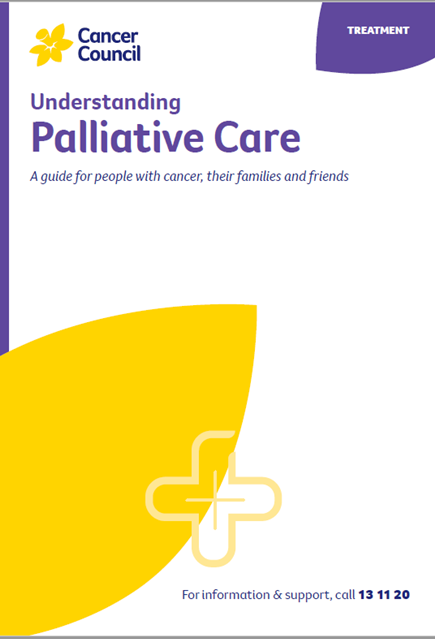- Home
- About Cancer
- Advanced cancer
- Facing end of life
- Common questions about dying
- How does palliative care help?
How does palliative care help?
Palliative care is a person-centred approach to care that can help people with a progressive, life-limiting illness to live as fully and as comfortably as possible. It’s sometimes called supportive care. The main goal is to help you maintain your quality of life by identifying and dealing with your physical, practical, emotional, cultural, social and spiritual needs. Palliative care also offers support to family and carers.
The available palliative care services are usually tailored to your individual needs, and may include:
- relief of pain and other symptoms such as fatigue, nausea, vomiting, and shortness of breath
- resources such as equipment to help manage care at home
- help for families to gather and talk about sensitive or complex issues
- links to other services such as home help and financial or legal support
- support for emotional, cultural, social and spiritual concerns
- referrals to respite care services.
Palliative care may be coordinated by your GP or community nurse. And health professionals, volunteers and carers often work together to deliver your care. If you have more complex needs, your care may be led by a specialist palliative care service. They can also advise other health professionals on ways to manage symptoms.
The advising health professional will suggest the most suitable plan. Palliative care may be provided at home, in a hospital, in a palliative care unit (sometimes called a hospice) or in a residential aged care facility. Palliative care is different in each state and territory – find your local palliative care body at palliativecare.org.au.
For more on this, see Palliative care, call 13 11 20, or listen to our podcast The Thing About Advanced Cancer.
→ READ MORE: Who will I see for my care?
More resources
Prof Jane Phillips, Head, School of Nursing and Professor, Centre for Healthcare Transformation, Queensland University of Technology and Emerita Professor Palliative Nursing, University of Technology Sydney, NSW; Prof Meera Agar, Palliative Care Physician, Professor of Palliative Medicine, University of Technology Sydney, IMPACCT, Sydney, NSW; Sandra Anderson, Consumer; A/Prof Megan Best, The University of Notre Dame Australia and The University of Sydney, NSW; Prof Lauren Breen, Psychologist and Discipline Lead, Psychology, Curtin University, WA; David Dawes, Manager, Spiritual Care Department, Peter MacCallum Cancer Centre, VIC; Rob Ferguson, Consumer; Gabrielle Gawne-Kelnar, Counsellor, Psychotherapist and Social Worker, One Life Counselling & Psychotherapy, NSW; Justine Hatton, Senior Social Worker, Southern Adelaide Palliative Services, Flinders Medical Centre, SA; Caitlin MacDonagh, Clinical Nurse Consultant, Palliative Care, Royal North Shore Hospital, Northern Sydney Local Health District, NSW; McCabe Centre for Law and Cancer; Palliative Care Australia; Belinda Reinhold, Acting Lead Palliative Care, Cancer Council QLD; Xanthe Sansome, National Program Director, Advance Care Planning Australia; Kirsty Trebilcock, 13 11 20 Consultant, Cancer Council SA.
View the Cancer Council NSW editorial policy.
View all publications or call 13 11 20 for free printed copies.
Need to talk?
Support services
Caring for someone with cancer
Speak to a health professional or to someone who has been there, or find a support group or forum
Cancer Council Online Community
A community forum – a safe place to share stories, get tips and connect with people who understand
Cancer information
Emotions and cancer
Learn about the range of emotions you may experience if you are affected by cancer
Advanced cancer
Information for all stages of advanced cancer, from the initial diagnosis to palliative care and grief

